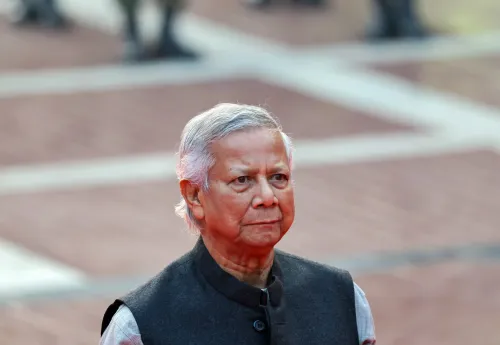North Korea Announces Successful Launch of New Intermediate-Range Hypersonic Missile

Seoul, Jan 7 (NationPress) North Korea announced on Tuesday that it has successfully test-launched a new intermediate-range ballistic missile (IRBM) equipped with a hypersonic warhead, asserting that this weapons system will serve as a reliable deterrent against any adversaries in the Pacific region.
However, the South Korean military expressed skepticism regarding the North's claims about the hypersonic missile launch, suggesting it could be a "deception," raising doubts about the missile's claimed flight distance and other specifications.
According to North Korea, the missile traveled approximately 1,500 kilometers at a speed of 12 times the speed of sound during testing overseen by leader Kim Jong-un through a monitoring system, as reported by Yonhap news agency citing the Korean Central News Agency (KCNA).
The South's Joint Chiefs of Staff (JCS) indicated on Monday that the North's suspected hypersonic missile, launched from the Pyongyang area, flew around 1,100 km before crashing into the East Sea.
Kim Jong-un remarked that the development of such a missile is intended to enhance the nation's nuclear deterrent by "making the weapon system to which no one can respond the linchpin of strategic deterrence."
He stated, "The hypersonic missile system will reliably contain any rivals in the Pacific region that can affect the security of our state," as per the KCNA.
"The system can deal a serious military strike to a rival while effectively breaking any dense defensive barrier," he added.
The latest missile launch from the North, the first such act in around two months, occurred about two weeks prior to US President-elect Donald Trump's inauguration on January 20.
This event also coincided with political unrest in South Korea, which was triggered by President Yoon Suk Yeol's failed martial law attempt last month and his subsequent impeachment by the National Assembly.
A South Korean unification ministry official stated, "North Korea probably intended to flex its muscle against the United States. As it said the latest launch was a test-firing, the weapons system does not appear to be completed, indicating a demand for further military technology development."
A hypersonic missile is typically challenging to intercept with current missile defense systems. It travels at speeds of at least Mach 5, which is five times the speed of sound, and is designed to maneuver along unpredictable flight paths at low altitudes.
The KCNA reported that the hypersonic glide vehicle atop the new IRBM reached its first peak at a height of 99.8 km and the second at 42.5 km while completing its 1,500-km flight before hitting a designated target at sea.
Nevertheless, the South Korean military dismissed the North's assertions as a "deception," stating that there was no evidence of a second peak.
Col. Lee Sung-un, a spokesperson for the JCS, noted at a regular press briefing that "the flight range analyzed by South Korea, the US, and Japan was around 1,100 km, and the missile did not reach a second peak," emphasizing that the North has a history of exaggerating its claims.
North Korea also asserted that a new carbon fiber compound was utilized in the manufacturing of the hypersonic missile's engine body, and an unspecified "comprehensive and effective" method was introduced for the flight and guidance control system.
Experts indicated that the North likely tested an upgraded version of the hypersonic missile launched in April of the previous year, when Pyongyang claimed that the IRBM loaded with a hypersonic glide vehicle flew 1,000 km.
At that time, the South's JCS stated that the missile flew 600 km, labeling the North's claims as partially "exaggerated," although they acknowledged that Pyongyang seems to have made some technological advances in its hypersonic weapons program.
Hong Min, a senior research fellow at the Korea Institute for National Unification, stated, "As the North has claimed it has acquired technology that is 'by no means easy,' there could be a technical improvement of its own. However, it is also challenging to rule out the possibility of technical cooperation from Russia."
North Korea and Russia have been strengthening their military collaboration under a mutual defense agreement signed in June, with accusations that the North has sent over 11,000 troops to Russia to assist in its conflict against Ukraine.
Among the advanced weapons systems that Kim pledged to develop during a significant party congress in 2021 are hypersonic missiles, nuclear-powered submarines, spy satellites, and solid-fuel intercontinental ballistic missiles.
During a year-end party meeting, the North's leader declared that his nation would implement the "toughest" counteraction strategy against the US, asserting that military cooperation among South Korea, the US, and Japan has evolved into a "military bloc for aggression."









